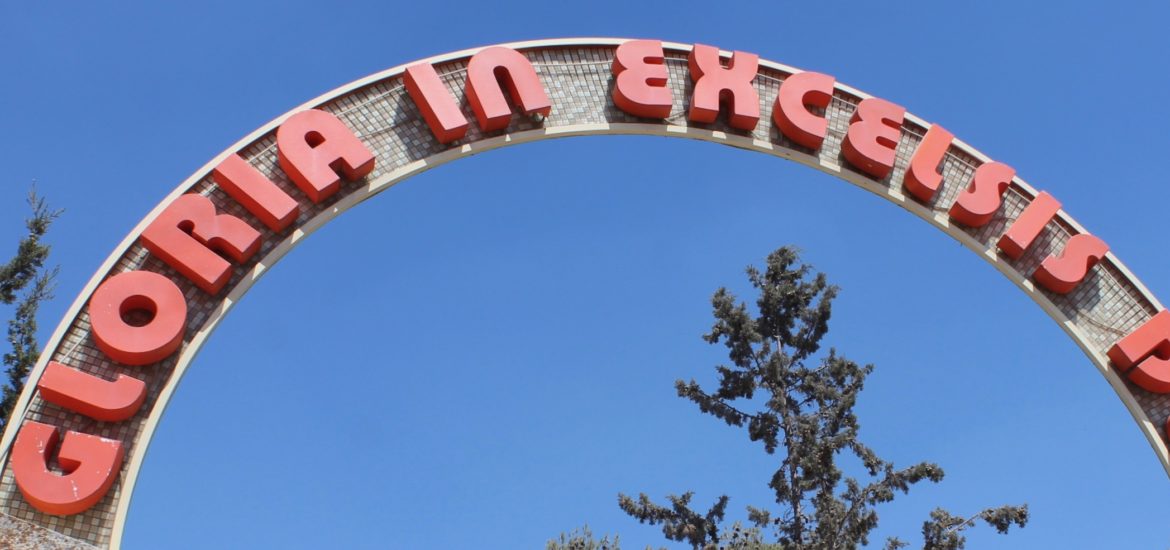On Saturday morning, August 10, we had an early wake-up in Jerusalem since we had a lot on the agenda (of course it wasn’t as early as my 5:15am wake-up the day before!) On this day, we were to hear firsthand from a Palestinian journalist as well as two young Palestinian men who live in Bethlehem, and who are hoping to change their situation. Later in the day, we would travel to the lowest point on earth – the Dead Sea!
We awoke once again at the Tryp by Windham Jerusalem Bat Sheva hotel. It has been a wonderful experience here so far. A boutique hotel in a great location, great accommodations (including the most amazing shower), a fantastic view of the city from the rooftop deck, and a splendid buffet breakfast. The Israel Collective sure knows how to organize a trip. This is the 19th trip that Josh Ahrens and Raj Nair have organized and they have it down to a science. I’m eternally grateful for all they have done to make this experience so incredible on every level.
 After we polished off our breakfast, we met downstairs in a conference room at the hotel. We were hearing a private lecture from Khaled Abu Toameh, an Israeli-Palestinian journalist who works for The Jerusalem Post. He is an award-winning journalist who has also worked as a correspondent and producer for NBC News. After listening to him for an hour, with a healthy Q&A for an additional 30 minutes, I can say he is now my go-to news source on all things Israel. You can follow him on Twitter here.
After we polished off our breakfast, we met downstairs in a conference room at the hotel. We were hearing a private lecture from Khaled Abu Toameh, an Israeli-Palestinian journalist who works for The Jerusalem Post. He is an award-winning journalist who has also worked as a correspondent and producer for NBC News. After listening to him for an hour, with a healthy Q&A for an additional 30 minutes, I can say he is now my go-to news source on all things Israel. You can follow him on Twitter here.
Khaled is a Palestinian who lives in Jerusalem. He told us, “As a Palestinian, there’s only one place I feel safe: here in Israel.” He feels less safe in the Palestinian-controlled area of the West Bank, but he also feels completely unsafe in the Hamas-controlled area of the Gaza Strip and won’t even go there anymore. He had one interesting comment for us Americans: he said he feels safer in Israel than he does on most college campuses in America. He specifically said he would no longer speak on college campuses in California. He told us they no longer want to engage people with other opinions, they just want to shout them down and silence them. He said it’s something all Americans should be troubled by.
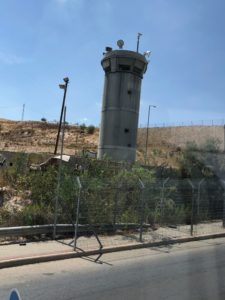 As for the current situation with the Israelis and Palestinians, he puts most of the blame on Palestinians. He said there is an absence of peace and education on the Palestinian side. He also has not found any Palestinian leader who has had the courage to stand up and tell their people they have to make some concessions. They are never going to get 100% of what they want. Back during the Camp David Summit held by President Clinton, the Israelis offered to give the Palestinians 94% of what they wanted. Not only did the Palestinians – then under Arafat – reject this, they didn’t even make a counteroffer. Instead, they ramped up terrorism in what became known as the Second Intifada. This led to thousands of deaths on both sides of the conflict.
As for the current situation with the Israelis and Palestinians, he puts most of the blame on Palestinians. He said there is an absence of peace and education on the Palestinian side. He also has not found any Palestinian leader who has had the courage to stand up and tell their people they have to make some concessions. They are never going to get 100% of what they want. Back during the Camp David Summit held by President Clinton, the Israelis offered to give the Palestinians 94% of what they wanted. Not only did the Palestinians – then under Arafat – reject this, they didn’t even make a counteroffer. Instead, they ramped up terrorism in what became known as the Second Intifada. This led to thousands of deaths on both sides of the conflict.
He says the Palestinians are divided into two camps: those who do not want to make peace with Israel and those who cannot make peace with Israel. The main thing I learned today from Khaled is certainly something I could have learned by opening a book or reading some articles, but our daily life here in the U.S. is so distracted by other things we often don’t take the time to learn – and our news media isn’t giving us the right perspective. In fact, Khaled told us that the American and Western media is “obsessed with Israel,” to the point they rarely cover other major news in the Middle East. “No Jews, no news,” is a humorous term he and his fellow journalists use to muse about the American and Western media’s obsession with Israel.
 There is often talk about a two-state solution, which is likely the best solution long-term. But Khaled told us we currently are living with a 3-state solution: Israel, the West Bank (Palestinian Authority), and Gaza (Hamas). The Palestinian people are divided into two territories that are not controlled by Israel. The main area is the West Bank, which is controlled by the Palestinian Authority. However, the other area is the Gaza Strip, which is controlled by Hamas. And, the Palestinian Authority and Hamas don’t see eye to eye and in fact Hamas overtook the Palestinian Authority thirteen years ago in Gaza. Hamas is clearly the more radical of the two groups. The Palestinian Authority actually works with Israel on security and even engages in peace talks from time to time. Hamas wants to see the complete eradication of the Jewish state and the complete eradication of the Jewish people from this region.
There is often talk about a two-state solution, which is likely the best solution long-term. But Khaled told us we currently are living with a 3-state solution: Israel, the West Bank (Palestinian Authority), and Gaza (Hamas). The Palestinian people are divided into two territories that are not controlled by Israel. The main area is the West Bank, which is controlled by the Palestinian Authority. However, the other area is the Gaza Strip, which is controlled by Hamas. And, the Palestinian Authority and Hamas don’t see eye to eye and in fact Hamas overtook the Palestinian Authority thirteen years ago in Gaza. Hamas is clearly the more radical of the two groups. The Palestinian Authority actually works with Israel on security and even engages in peace talks from time to time. Hamas wants to see the complete eradication of the Jewish state and the complete eradication of the Jewish people from this region.
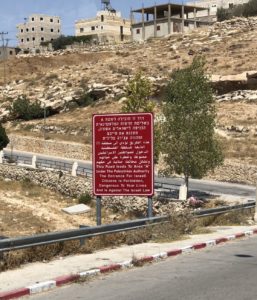 According to Khaled, the Palestinian Authority is, ironically, being kept in power by Israel, because as soon as they make peace, they would be run out of town (like they were in Gaza). So, he suggests that the best thing Israel should do is what it’s currently doing: work with Palestinians who want to work with Israel, and shoot back against any Palestinian that shoots at Israel. “Welcome to the status quo,” he said.
According to Khaled, the Palestinian Authority is, ironically, being kept in power by Israel, because as soon as they make peace, they would be run out of town (like they were in Gaza). So, he suggests that the best thing Israel should do is what it’s currently doing: work with Palestinians who want to work with Israel, and shoot back against any Palestinian that shoots at Israel. “Welcome to the status quo,” he said.
The Palestinian authority is both an enemy and an ally. It’s an enemy when it comes to rhetoric. It’s an ally when it comes to security in the West Bank. There was a lot to take in from his talk, but I appreciated his honesty and his candor, especially considering he has to live and work here, as a Palestinian journalist.
When we were done hearing from Khaled, we all piled into our tour bus and headed just a few miles away to the West Bank, and specifically to the Palestinian-controlled territory of Bethlehem.
 Before we crossed into Bethlehem, our Israeli tour guide, Yoav had to depart the bus. You see, Israeli Jews are not allowed into this area – and that law is enforced by Israel. It is considered “Zone A” of the West Bank. Zone A is completely controlled by the Palestinian Authority. During other parts of our trip, we were briefly in Zones B and C. Zone C is completely controlled by Israeli civil and security control. Zone B is under Palestinian civil control, but under a joint Palestinian-Israeli security control.
Before we crossed into Bethlehem, our Israeli tour guide, Yoav had to depart the bus. You see, Israeli Jews are not allowed into this area – and that law is enforced by Israel. It is considered “Zone A” of the West Bank. Zone A is completely controlled by the Palestinian Authority. During other parts of our trip, we were briefly in Zones B and C. Zone C is completely controlled by Israeli civil and security control. Zone B is under Palestinian civil control, but under a joint Palestinian-Israeli security control.
When you cross zones, you stop at security check points. The lines to get into Zones A and B are never long. The lines to get out are under more scrutiny. Our guides pointed this out to us – it’s clear to everyone here no one is fearful of Israelis committing acts of terrorism in the West Bank. But everyone has every reason to fear Palestinians coming into Israel to do harm – so they must all be checked. While most Palestinians are peaceful people, there are still plenty of terrorists who are bred here.
While Yoav departed our bus, and stayed on the Israeli side of the security fence, we picked up a new tour guide on the “Zone A” side in Bethlehem. It was kind of odd. For those who remember The Great Movie Ride at Disney Hollywood Studios, it kind of felt like that scene where you lose your original guide and a new guide takes over the rest of the tour. The new guide was great and showed us around his city of Bethlehem. But the first place we went in Bethlehem was – ironically – an inn.
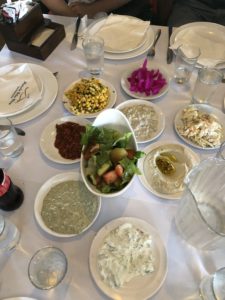 This is the city where Mary and Joseph fled to when she was pregnant with Jesus. They were also living in a time when the state wanted to control its citizens. In fact, Luke chapter 2 begins with the historical reality at the time, “in those days a decree went out from Caesar Augustus that the whole world should be enrolled … so all went to be enrolled, each to his own town.” The parents of Jesus came here because Joseph “was of the house and family of David,” and Bethlehem was known as the city of David’s birth. Of course, when Joseph and Mary arrived here, they could not find an inn. I’ll get back to this part of the story of Bethlehem a little later. But travelers here should know there are now plenty of inns!
This is the city where Mary and Joseph fled to when she was pregnant with Jesus. They were also living in a time when the state wanted to control its citizens. In fact, Luke chapter 2 begins with the historical reality at the time, “in those days a decree went out from Caesar Augustus that the whole world should be enrolled … so all went to be enrolled, each to his own town.” The parents of Jesus came here because Joseph “was of the house and family of David,” and Bethlehem was known as the city of David’s birth. Of course, when Joseph and Mary arrived here, they could not find an inn. I’ll get back to this part of the story of Bethlehem a little later. But travelers here should know there are now plenty of inns!
Today, Bethlehem is a city of 200,000 people. 90% of these people are Muslim and about 10% are Christian. In addition to the birth of Christ, King David was also born here. Jacob’s wife Rachel died here, where she had her son Benjamin. Ruth & Boaz, the parents of David, also lived here. To say we were in the heart of the Land of the Bible is an understatement. However, due to the laws governing “Zone A,” there are no Jews in this area of Judea today.
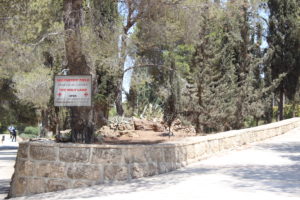 As for us, our first stop was at a hotel where we would hear privately from two young Palestinian men, in their mid-20s, who are courageously sharing their story with groups like us who want to listen. I cannot give you their names because their lives would be at stake if I did. However, I can tell you that one of them is a Muslim and the other a Christian. They both told us about the education system they grew up under. The things they are taught about Israel and the Jews are not only not historical, but in many cases hateful. After visiting Yav Gashem, the Holocaust museum yesterday, the historical parallels with how the Nazis talked about the Jews seemed unsettling, to say the least.
As for us, our first stop was at a hotel where we would hear privately from two young Palestinian men, in their mid-20s, who are courageously sharing their story with groups like us who want to listen. I cannot give you their names because their lives would be at stake if I did. However, I can tell you that one of them is a Muslim and the other a Christian. They both told us about the education system they grew up under. The things they are taught about Israel and the Jews are not only not historical, but in many cases hateful. After visiting Yav Gashem, the Holocaust museum yesterday, the historical parallels with how the Nazis talked about the Jews seemed unsettling, to say the least.
But then you peel back the layers and you see there are problems here that are tough to solve. Because of the current status quo, Israelis and Palestinians are divided, especially given the fact that no Israeli Jews are allowed in Gaza or “Zone A” of the West Bank. The only time a Palestinian in these territories might see an Israeli Jew are if members of the Israeli Defense Force (IDF) are needed to come in. So, if the only Israeli Jews you come in contact with are the military forces, the view you have of them is warped. Israelis are seen as colonizers (someone to fear). It’s not quite segregation or apartheid, as many Palestinians are living on the Israeli side as well, but the ones who never get over to the Israeli side have a very skewed view of Israeli Jews.
 With that said, one of our speakers said despite what the education system did – and did not – teach him about Israeli Jews, he remained curious to learn more about them. He realized he wasn’t being given all the information by the tightly-controlled Palestinian education system. He said that in 12 years of school, Palestinian children learn nothing about Jewish history in this land. There are only two paragraphs in all of his textbooks that dealt with the Holocaust – and the only mention of the Holocaust was to say that it caused European Jews to come here and use their dire circumstances to get the international community’s approval for a safe land to live in – by taking the land of Palestinians. The education system constantly reminds all Palestinian children that you’re a refugee and you have “the right to return.”
With that said, one of our speakers said despite what the education system did – and did not – teach him about Israeli Jews, he remained curious to learn more about them. He realized he wasn’t being given all the information by the tightly-controlled Palestinian education system. He said that in 12 years of school, Palestinian children learn nothing about Jewish history in this land. There are only two paragraphs in all of his textbooks that dealt with the Holocaust – and the only mention of the Holocaust was to say that it caused European Jews to come here and use their dire circumstances to get the international community’s approval for a safe land to live in – by taking the land of Palestinians. The education system constantly reminds all Palestinian children that you’re a refugee and you have “the right to return.”
One of these two also told us that he believes two things will help Palestinians: more English education as well as more arts and music. He thinks these things will help them expand their mind and he is working to do just that.
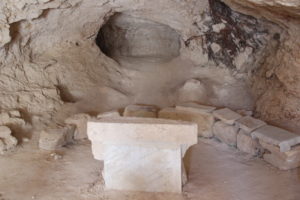 The one Palestinian Christian who spoke to us shared with us his testimony of growing up Christian, but not religious. He was peer pressured into converting to Islam, but did not want to. He said he thought it would be dishonorable to go against his father’s religion. At the age of 15, after getting bullied and beat up by Muslims at school, he left Gaza, which is controlled by Hamas. He fled to the West Bank and also spent some time in Jerusalem. But he mostly lived on the streets in Bethlehem. He became addicted to drugs and alcohol and was homeless.
The one Palestinian Christian who spoke to us shared with us his testimony of growing up Christian, but not religious. He was peer pressured into converting to Islam, but did not want to. He said he thought it would be dishonorable to go against his father’s religion. At the age of 15, after getting bullied and beat up by Muslims at school, he left Gaza, which is controlled by Hamas. He fled to the West Bank and also spent some time in Jerusalem. But he mostly lived on the streets in Bethlehem. He became addicted to drugs and alcohol and was homeless.
One day, a group of Christian missionaries came across him and started talking to him. They tried to help him and he at first resisted. He told them he didn’t believe in God. He also told them he was mad at God for putting him in this situation. They questioned him: how can you be mad at God if he doesn’t exist? That made him think. He slowly returned back to church. As his faith came alive, his life changed. He’s only in his mid-20s today and from hearing him speak for about 30 minutes or so, I can say I was impressed with his maturity and motivation. While I cannot share his name, I can share a video that the Israel Collective made featuring him. They changed his voice and did not show his face. You can watch the video here.
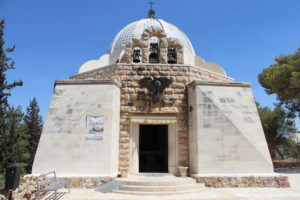 After hearing from these two remarkable young men, we left the hotel and were taken down the street to the Tent Restaurant in the Shepherd’s Valley. It was an outdoor seating with a very large covered patio. Once again, family style servings and another full belly. Plus, hookah pipes are brought right to your table, if you want to partake in that. My table did not, so I went over to another table for a few puffs.
After hearing from these two remarkable young men, we left the hotel and were taken down the street to the Tent Restaurant in the Shepherd’s Valley. It was an outdoor seating with a very large covered patio. Once again, family style servings and another full belly. Plus, hookah pipes are brought right to your table, if you want to partake in that. My table did not, so I went over to another table for a few puffs.
Once finished, we were taken to the Shepherd’s Fields. This is the area where it is believed angels first proclaimed the Good News to the humble shepherds in the field. Also, because Mary and Joseph could not find room at the inn, they had to find a more humble place for her to birth the child. Our local guide said that traditionally in the West we are led to believe that Jesus was born in a barn or stable. However, he told us to take a look around. There’s no farms in this area and there were not any then. And the Bible doesn’t mention this either. Rather, there are many shepherds in the fields – something the Bible does mention. And, those shepherds often take dwellings in many caves.
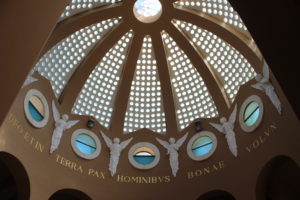 We were given a first-hand look at some of those caves. The shepherds move their sheep around each day – and each night they take a dwelling in a close by cave, often a different one each day. It was a neat experience. While no one knows exactly where Jesus was born, we definitely got an image today of the kind of place he was born in. A humble abode indeed.
We were given a first-hand look at some of those caves. The shepherds move their sheep around each day – and each night they take a dwelling in a close by cave, often a different one each day. It was a neat experience. While no one knows exactly where Jesus was born, we definitely got an image today of the kind of place he was born in. A humble abode indeed.
We finished our time here by going up to an area that has a nice lookout over those shepherds’ fields. Today, I was given the opportunity to read some of the scripture verses to the group and it was incredibly moving to do so from this specific location. I read the group some of the verses from Luke, Chapter 2:
And Joseph too went up from Galilee from the town of Nazareth to Judea, to the city of David that is called Bethlehem, because he was of the house and family of David, to be enrolled with Mary, his betrothed, who was with child. While they were there, the time came for her to have her child, and she gave birth to her firstborn son. She wrapped him in swaddling clothes and laid him in a manger, because there was no room for them in the inn. Now there were shepherds in that region living in the fields and keeping the night watch over their flock. The angel of the Lord appeared to them and the glory of the Lord shone around them, and they were struck with great fear. The angel said to them, “Do not be afraid; for behold, I proclaim to you good news of great joy that will be for all the people. For today in the city of David a savior has been born for you who is Messiah and Lord. And this will be a sign for you: you will find an infant wrapped in swaddling clothes and lying in a manger.”
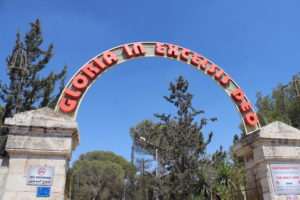 And suddenly there was a multitude of the heavenly host with the angel, praising God and saying: “Glory to God in the highest and on earth peace to those on whom his favor rests.” When the angels went away from them to heaven, the shepherds said to one another, “Let us go, then, to Bethlehem to see this thing that has taken place, which the Lord has made known to us.” So they went in haste and found Mary and Joseph, and the infant lying in the manger. When they saw this, they made known the message that had been told them about this child. All who heard it were amazed by what had been told them by the shepherds. And Mary kept all these things, reflecting on them in her heart. Then the shepherds returned, glorifying and praising God for all they had heard and seen, just as it had been told to them.
And suddenly there was a multitude of the heavenly host with the angel, praising God and saying: “Glory to God in the highest and on earth peace to those on whom his favor rests.” When the angels went away from them to heaven, the shepherds said to one another, “Let us go, then, to Bethlehem to see this thing that has taken place, which the Lord has made known to us.” So they went in haste and found Mary and Joseph, and the infant lying in the manger. When they saw this, they made known the message that had been told them about this child. All who heard it were amazed by what had been told them by the shepherds. And Mary kept all these things, reflecting on them in her heart. Then the shepherds returned, glorifying and praising God for all they had heard and seen, just as it had been told to them.
We looked out across those shepherds’ fields and reflected about this solemn place, where the good news of the birth of Our Savior Jesus Christ was first told to the humble shepherds watching over their flock during the night. This place was a solemn reminder that God first reveals Himself to the humble, not to the powerful.
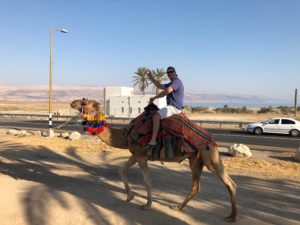 We then visited a small church here on these grounds, one that is under the stewardship of the Franciscans, who have been stewards in this land, protecting and maintaining many of the most important holy sites in our Christian faith for the past 800 years. They are perhaps some of the humble shepherds of today.
We then visited a small church here on these grounds, one that is under the stewardship of the Franciscans, who have been stewards in this land, protecting and maintaining many of the most important holy sites in our Christian faith for the past 800 years. They are perhaps some of the humble shepherds of today.
We left Bethlehem and crossed back over into Israel. We said goodbye to our Palestinian guide and once back in “Zone C” we were able to pick up Yoav, who then accompanied us on our hour-long drive to the Dead Sea, which is in “Zone B” of the West Bank (yea, I hope you’re not confused yet).
As we were getting close to the Dead Sea, my ears were popping. We were going to the lowest place on earth – 420 feet below sea level! I then noticed a pretty sizeable city over to the left and asked Raj – “oh wow, people live here?” He said, “That’s Jericho.”
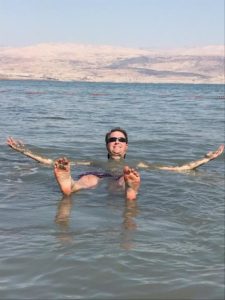 “That’s Jericho? As in THE Jericho?” I was astonished. Scenes and cities from the Bible are all around us. Once we got to the Dead Sea, we looked across it. About a mile away, on the other side of the water, is the nation of Jordan. Amazingly close.
“That’s Jericho? As in THE Jericho?” I was astonished. Scenes and cities from the Bible are all around us. Once we got to the Dead Sea, we looked across it. About a mile away, on the other side of the water, is the nation of Jordan. Amazingly close.
The Dead Sea is one of the most interesting places I’ve ever been. You know what you’re getting into going into this situation. It is about 10 times saltier than the ocean. It’s so salty, you immediately float. You just go into a couple feet of water and lay down on your back – and you float! It was the coolest experience ever. Just don’t get any water in your eyes (I wore my sunglasses for added protection). The sea is also physically dead – no life survives in it. So, no fish. The “beach” area is clay, rather than sand. And when you step into the water, it becomes mud. It’s an excellent place for a mud bath.
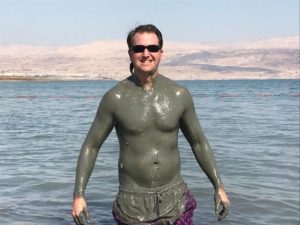 You are able to scoop the mud off the ground and put it all over your body (which of course, most of us did). Both the salt and mud are healing forces. It’s a magical place. After about a half hour in the Dead Sea, it was time to wash off (there are changing rooms here with showers). I then went over to the bar, which touts itself as “the lowest bar in the world.” How can you not have a drink here? So, of course, we did. There’s also a nice gift shop nearby with Dead Sea protects made from the minerals that are unique to this area. I might have picked up some souvenirs for some family and friends back home. Mud bath anyone?
You are able to scoop the mud off the ground and put it all over your body (which of course, most of us did). Both the salt and mud are healing forces. It’s a magical place. After about a half hour in the Dead Sea, it was time to wash off (there are changing rooms here with showers). I then went over to the bar, which touts itself as “the lowest bar in the world.” How can you not have a drink here? So, of course, we did. There’s also a nice gift shop nearby with Dead Sea protects made from the minerals that are unique to this area. I might have picked up some souvenirs for some family and friends back home. Mud bath anyone?
Nearby the Dead Sea, we stopped to ride a camel. For $5 you can ride the camel for a few minutes and get your photo taken. Hey, when you’re in the Middle East, you should do Middle East things like ride a camel, take a mud bath in the Dead Sea, and drink at the lowest bar in the world. If these things weren’t on the bucket list before, I made sure they were checked off today.
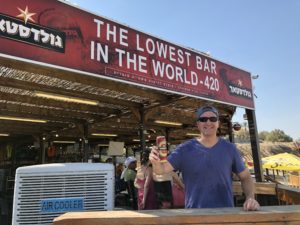 That night, after returning to Jerusalem, we were “on our own” for dinner, meaning no one was buying it for us or deciding for us where we should eat. I joined a good part of our group and we went to a nearby restaurant called Focaccia Bar. It was an outdoor, open-air seating on a nice big patio. A beautiful night. The cuisine was a mix of many items. I saw Weiner Schnitzel on the menu and couldn’t resist thinking of the delicious food I had last summer in Vienna. It was amazing here too!
That night, after returning to Jerusalem, we were “on our own” for dinner, meaning no one was buying it for us or deciding for us where we should eat. I joined a good part of our group and we went to a nearby restaurant called Focaccia Bar. It was an outdoor, open-air seating on a nice big patio. A beautiful night. The cuisine was a mix of many items. I saw Weiner Schnitzel on the menu and couldn’t resist thinking of the delicious food I had last summer in Vienna. It was amazing here too!
After dinner, we met up with my new friend Jared, from the Our Soldiers Speak group, and some of his crew, which included law and policy students from many parts of the world (Kenya, Uganda, China, Switzerland, the United States, and other places). Their local guide was in a cover band here and they were listening to the band play at a nearby music hall called Blue Hall Music. It was a great scene inside, very relaxed. The sound was great and it was a fun opportunity to catch up with our new friends over a beer and some music. We called it a night just before midnight and walked about 15 minutes back to our hotel.
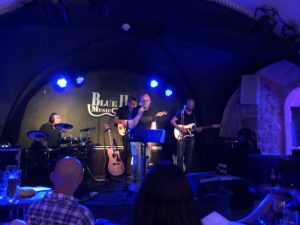 It had been a great day of learning what it was like to be a Palestinian without a nation, or a Jewish family who still can’t find room at an inn in Bethlehem. As for the Christians leading us through the Israel Collective, we are part of the next generation that hopes to bridge the divide and stand united for peace. For as the Angels once proclaimed, “Glory to God in the highest and on earth peace to those on whom his favor rests.”
It had been a great day of learning what it was like to be a Palestinian without a nation, or a Jewish family who still can’t find room at an inn in Bethlehem. As for the Christians leading us through the Israel Collective, we are part of the next generation that hopes to bridge the divide and stand united for peace. For as the Angels once proclaimed, “Glory to God in the highest and on earth peace to those on whom his favor rests.”
